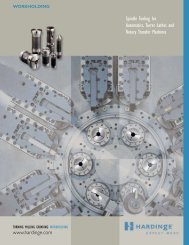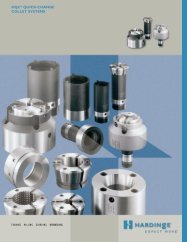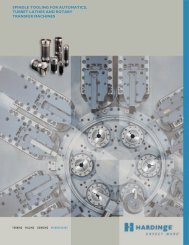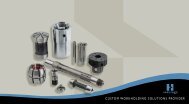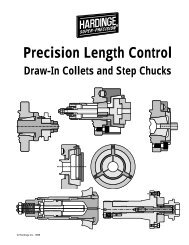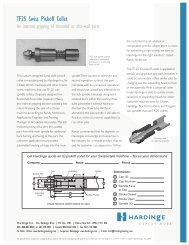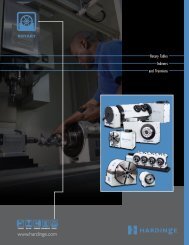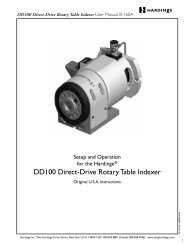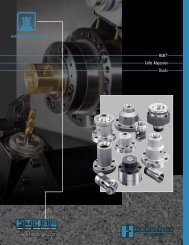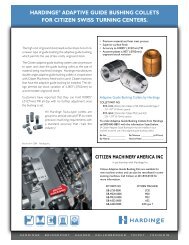Create successful ePaper yourself
Turn your PDF publications into a flip-book with our unique Google optimized e-Paper software.
<strong>Sure</strong>-Grip ® <strong>Power</strong> <strong>Chuck</strong> Safety and Technical Manual B-87Z<br />
Main Cutting Force<br />
µ SP <strong>Chuck</strong>ing Coefficient relates to the friction between the workpiece and the gripping surfaces of the top jaws. It is<br />
affected by the type of gripping surface on the jaws, the surface finish of the workpiece and the material the workpiece is<br />
made from. The chucking coefficient is shown in the following chart.<br />
µ SP <strong>Chuck</strong>ing Coefficent – Table 2<br />
Top Jaw Gripping Surface<br />
Turning – Boring Drilling<br />
Surface finish of the workpiece Smooth Serrated Smooth Serrated<br />
Smooth - Finish Ground or Turned 0.07 0.13 0.13 0.24<br />
Medium to Rough Turned Finish 0.11 0.22 0.22 0.40<br />
Unmachined Stock 0.15 0.31 0.31 0.55<br />
The above information relates to steel workpieces. When using other materials multiply the above<br />
number by the correction factors for the different materials:<br />
Specific Cutting Force Kc at Feed Sr – Table 3<br />
Aluminum Alloy 0.97<br />
Brass 0.92<br />
Grey Cast Iron 0.80<br />
Tensile Brinell Specific Cutting Force (Nmm 2 ) – Feed/Rev<br />
Material Strength Hardness 0.1mm 0.2mm 0.4mm 0.8mm<br />
N/mm 2 Numbers* .0025" .0058" .0157" .0315"<br />
Low carbon .15% C up to 490 Up to 150 3600 2600 1900 1360<br />
Low carbon .25% C 490 to 580 150 to 200 4000 2900 2100 1520<br />
Med. carbon .40% C 580 to 680 180 to 250 4200 3000 2200 1560<br />
High carbon .55% C 680 to 830 200 to 300 4400 3150 2300 1640<br />
Cast Steel 290 to 490 3200 2300 1700 1240<br />
490 to 680 3600 2600 1900 1360<br />
680+ 3900 2850 2050 1500<br />
Alloy Steels 680 to 830 4700 3400 2450 1760<br />
830 to 970 5000 3600 2600 1850<br />
970 to 1370 5300 3800 2650 2000<br />
1390 to 1700 5700 4100 3000 2150<br />
Stainless steel 580 to 680 5200 3750 2700 1920<br />
Tool Steel 1460 to 1750 5700 4100 3000 2150<br />
Cast iron up to 200 1900 13to 1000 720<br />
200 to 250 2900 2080 1500 1080<br />
Alloy 250 to 400 3200 2300 1700 1200<br />
Tempered 2400 1750 1250 920<br />
Copper 2100 1520 1100 800<br />
Copper (Collectors) 1900 1360 1000 720<br />
Brass 80 to 120 1600 1150 850 600<br />
Cast Copper 1400 1000 700 520<br />
Cast Bronze 3400 2450 1800 1280<br />
Zinc Alloy Zn-Al 10-Cu2 940 700 560 430<br />
Pure Aluminum 1050 760 550 400<br />
Aluminum alloy 11 to 13% Si 1000 700 520<br />
Piston Alloy Al, Si (G Al-Si) 1400 1000 700 520<br />
S Al-Si 11250 900 650 480<br />
Aluminum cast up to 290 1150 840 600 430<br />
290 to 420 1400 1000 700 520<br />
Wrought Aluminum 420 to 579 1700 1220 850 640<br />
Magnesium Alloys 580 420 300 220<br />
Rubber, ebonite 480 350 250 180<br />
* See ISO 4064 for Brinell Hardness Numbers<br />
Hardinge Inc. One Hardinge Drive, Elmira, New York U.S.A. 14902-1507 800.843.8801 www.hardingetooling.com<br />
108



